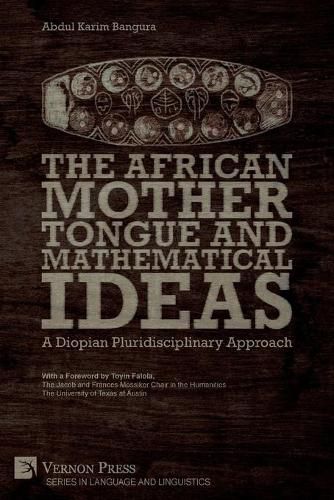Readings Newsletter
Become a Readings Member to make your shopping experience even easier.
Sign in or sign up for free!
You’re not far away from qualifying for FREE standard shipping within Australia
You’ve qualified for FREE standard shipping within Australia
The cart is loading…






This title is printed to order. This book may have been self-published. If so, we cannot guarantee the quality of the content. In the main most books will have gone through the editing process however some may not. We therefore suggest that you be aware of this before ordering this book. If in doubt check either the author or publisher’s details as we are unable to accept any returns unless they are faulty. Please contact us if you have any questions.
This book by renowned scholar Dr Abdul Karim Bangura combines linguistics and mathematics to show how and why African-centred mathematical ideas can be a driving force in Africa’s development efforts. Bangura explores the concept that Africa has been the centre of the History of Mathematics for thousands of years, as the civilizations that emerged across the continent developed contributions which would enrich both ancient and modern understanding of nature through mathematics. However, scholars and other professionals working in the field of mathematics education in Africa have identified a plethora of issues in carrying out their tasks. This is highlighted by one of the most compelling arguments in the book, which is that a major reason for these problems is the fact that the African mother tongues has been greatly neglected in the teaching of mathematics in the continent. Bangura asserts that a change has to be made in order for Africa to benefit from the exceptional opportunities mathematics offer, showing that, even if there is a great body of work connecting linguistics and mathematics, few analyses have been performed on the link between African languages and mathematics–and the ones that have been made are not theoretically-grounded on linguistics. Thus, the book begins by identifying the objects of study of linguistics and mathematics, and delineates which ones they have in common. Next, since the object of study of linguistics is language, the nine design features of language are employed to examine each of the objects as it pertains to African languages. After that, mathematical ideas of sustainability and those of tipping points are suggested as means to help Africa’s development efforts.
$9.00 standard shipping within Australia
FREE standard shipping within Australia for orders over $100.00
Express & International shipping calculated at checkout
This title is printed to order. This book may have been self-published. If so, we cannot guarantee the quality of the content. In the main most books will have gone through the editing process however some may not. We therefore suggest that you be aware of this before ordering this book. If in doubt check either the author or publisher’s details as we are unable to accept any returns unless they are faulty. Please contact us if you have any questions.
This book by renowned scholar Dr Abdul Karim Bangura combines linguistics and mathematics to show how and why African-centred mathematical ideas can be a driving force in Africa’s development efforts. Bangura explores the concept that Africa has been the centre of the History of Mathematics for thousands of years, as the civilizations that emerged across the continent developed contributions which would enrich both ancient and modern understanding of nature through mathematics. However, scholars and other professionals working in the field of mathematics education in Africa have identified a plethora of issues in carrying out their tasks. This is highlighted by one of the most compelling arguments in the book, which is that a major reason for these problems is the fact that the African mother tongues has been greatly neglected in the teaching of mathematics in the continent. Bangura asserts that a change has to be made in order for Africa to benefit from the exceptional opportunities mathematics offer, showing that, even if there is a great body of work connecting linguistics and mathematics, few analyses have been performed on the link between African languages and mathematics–and the ones that have been made are not theoretically-grounded on linguistics. Thus, the book begins by identifying the objects of study of linguistics and mathematics, and delineates which ones they have in common. Next, since the object of study of linguistics is language, the nine design features of language are employed to examine each of the objects as it pertains to African languages. After that, mathematical ideas of sustainability and those of tipping points are suggested as means to help Africa’s development efforts.